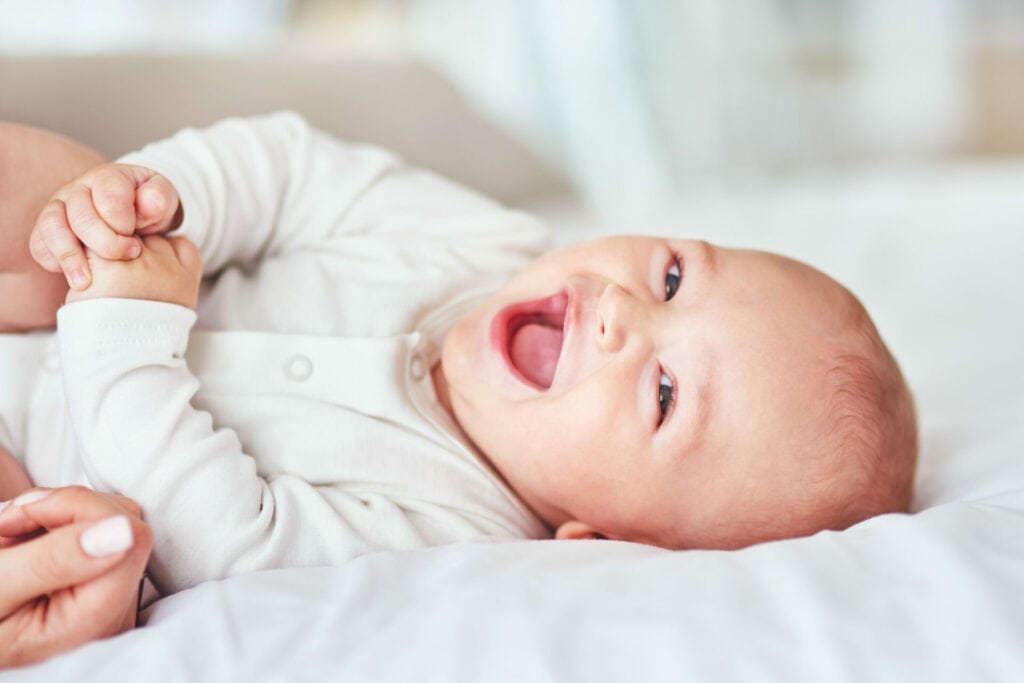Your child is 0-6 months old
The timeline below shows the milestones in your baby’s development. We should like to tell you about the things children experience in each developmental area and, of course, we also want to explain how we respond to this at KinderRijk.
Every child is unique. And that’s why every baby develops in his own way and at his own pace. We support and encourage this development where we can at KinderRijk. We give babies personal attention, give them room to explore their surroundings and encourage them to develop further in a natural way and through play.
Learn more about…

1. Motor skills
Motor skills are a vital aspect in the development of young babies. A baby needs motor skills in order to develop properly, because if your baby wants to explore the environment, he must be able to move around, grab things, hold things and move around.
During the first few months, your baby develops very rapidly and starts moving consciously and with focus. Between 3 and 6 months, your baby learns something every day. Babies discover their own hands and feet, try to grasp their feet and put their toes in their mouths. At this age, they explore all materials with their mouths.
We do not use bouncers because we want to give babies as much freedom of movement as possible. This is essential to their brain development.
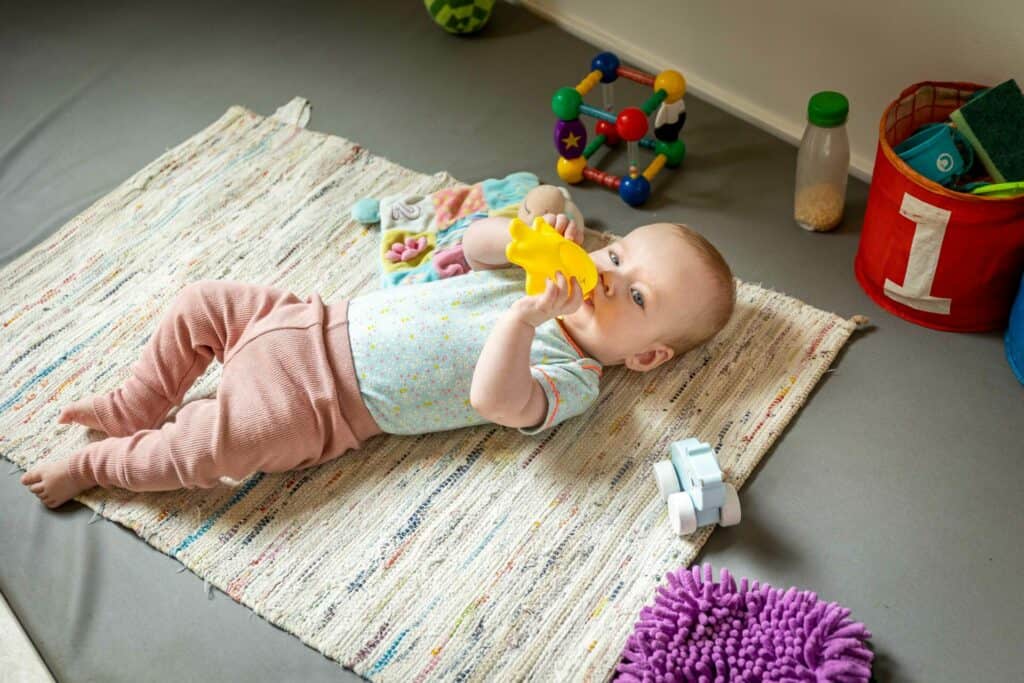
Milestones
-
Conscious reaching
Up to one and a half months, you will see spontaneous, uncontrolled movements in your baby, also called baby reflexes. At around 3 months of age, your baby will start to reach consciously. Grasping also develops together with reaching.
-
Grasping
Your baby grasps in a kind of reflex: when something touches his palm, he squeezes his hand. For example, your baby likes to grab your finger.
-
Exploring
From about 4 months, your baby can grasp and look at something. He often puts the object in his mouth in order to feel and explore it even better.
-
Rolling
From about 4 months, your baby will roll from back to tummy. In the beginning he will still need some help to roll back; from about 6 months, your baby is able to roll back and forth independently.
Freedom to move and explore the world
Your baby has an awareness of his own body from 4 months. This is reinforced by laying the child on his back. We encourage baby’s movement and change of posture by placing developmentally appropriate toys in a challenging position. For example, we put the toys a little further away so that your baby has to stretch to reach them.
We approach your baby sometimes from the right, sometimes from the left in order to use both halves of the body. To develop gross and fine motor skills, babies will need to have opportunities to reach, grab, kick and hold. We use open toys such as trays, cups, a colander, farmer’s handkerchief, rattles and an o-ball.


2. Language development
Before uttering his first real words, your baby is already actively learning to talk. Language development begins from birth; the first practice of communication is crying. As early as 6 weeks, your baby starts playing with sounds. Your baby imitates your mouth movement and uses non-verbal language. If your baby is excited, he will also kick his legs. In fact, babies use their whole body to communicate with you. As language development progresses, your baby is increasingly easy to understand.
“AT KINDERRIJK, WE TALK TO BABIES WHERE WE CAN. IT HELPS THEM TRANSITION FROM THE BABBLING STAGE TO REAL TALKING.”
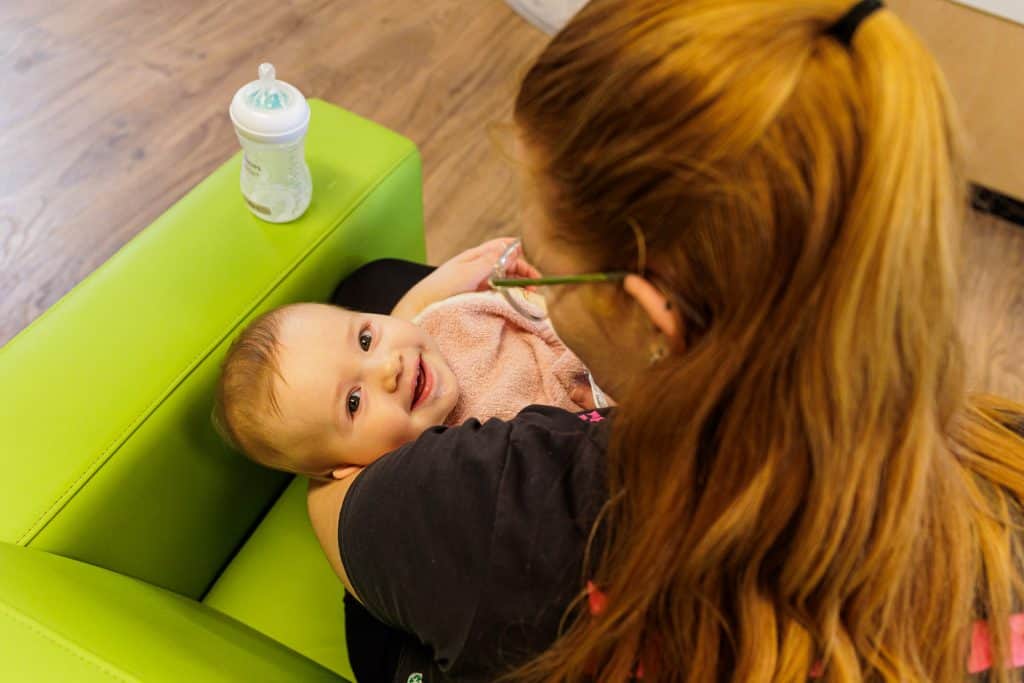
Milestones
-
Body language
Your baby gets to know you and himself through your hands. He enjoys and gains confidence when your hands are inviting, patient and calm.
-
Voice recognition
From 6 weeks, your baby recognises your voice. From 8 weeks, he responds by using his head to follow the voice.
-
Babbling
Around 2 to 3 months, your baby starts babbling. He starts imitating sounds and facial expressions. Your baby imitates the movements of your mouth.
-
Rhythm and sound
Your baby starts to recognise rhythm and sounds, and in this way he learns language.
Talking to babies
We talk to babies as much as possible at KinderRijk. This includes making eye contact. During nursing moments, such as changing nappies, we tell babies what we are doing. The baby does not yet understand what is being said, but listens to the tone and hears the difference in the way we speak. This is why we talk in a warm and loving voice. We give your baby time to respond. There will be increasing response: from a small sound to cooing, crowing and a laugh.
We set great store by reading to children at KinderRijk, even to the very little ones. Babies do not yet communicate with words, but with facial expressions, gestures and sounds. They prefer to listen to voices, which is important for their own language development. It helps them transition from the babbling stage to real talking.

3. Cognitive development
Your baby learns intuitively during the first few months. He has learned that crying yields him something: you will come and take a look and this reassures him. Your baby also learns that rattling or hitting toys produces sound. It’s useful if the toy is visible, so your baby can see where the sound is coming from.
The brain is in full development at birth, the connections in the brain increase because of all the things your child experiences. Experience like movement, tastes, smells, sounds, feelings create connections in the brain. At first, your baby experiences this as a whole, later he learns to distinguish between what he sees and hears.
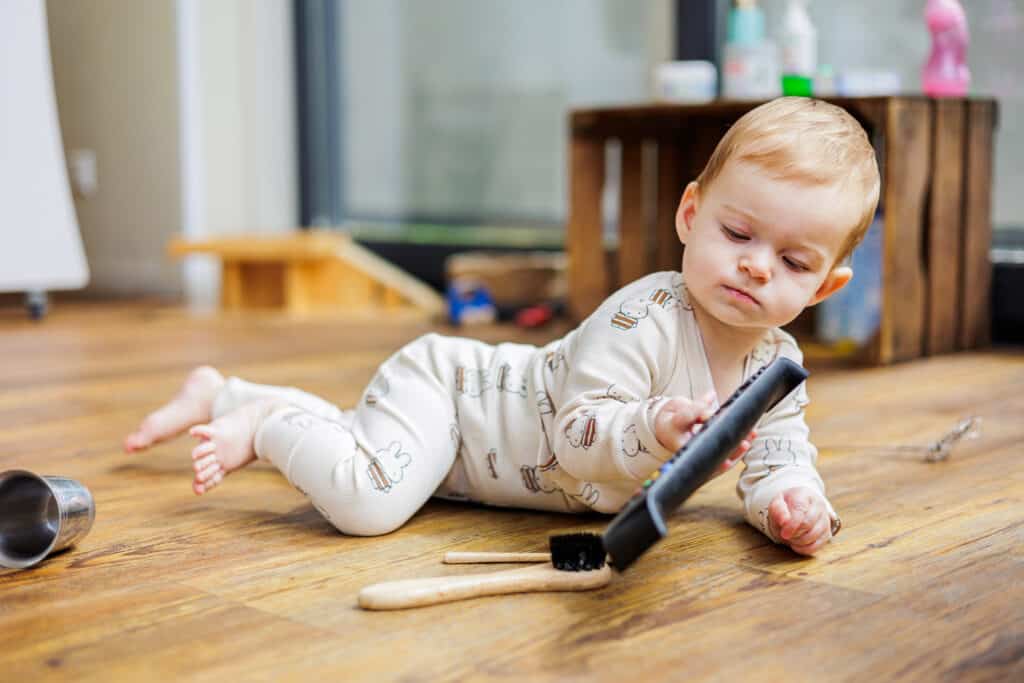
Milestones
-
Brain
Your baby develops his brain through all the movements he makes and the experiences he gains from them.
-
Discovering hands and feet
Your baby is discovering his hands and feet. He also discovers that he can move them by himself, although at first he is not yet aware that they are his own.
-
Playful learning, discovery
From 4 months onwards, your baby becomes interested in toys. When your baby holds a rattle, he learns that a sound can be heard when it’s moved.
Open-ended toys
We provide an attractive and pre-setup play area with a range of varied materials with different textures: hard, soft, cold, warm, rough, smooth. At KinderRijk, we choose materials such as a colander, farmer’s handkerchief, plastic containers, etc., because these stimulate your baby’s curiosity. These are called open-ended toys.
“AT KINDERRIJK, WE USE OPEN-ENDED TOYS, AS THIS STIMULATES YOUR BABY’S CURIOSITY.”


4. Personality development
Each child is unique and has his own temperament. Your baby may react differently at home than he does at the day-care centre or at his grandma and grandpa. Some babies put everything in their mouths, while others are more interested in moving around. Your baby’s realisation that he exists and that he is the one who causes reactions starts with an exploration of his own body. This occurs at about 3 months and this is how he develops into an autonomous child who discovers that he can influence his environment.

Milestones
-
Self-regulation
Your baby depends on the availability of adults for his development. Pleasant interactions with your baby develop his capacity for self-regulation. On the dresser, he will avert his gaze when he is ‘finished talking’ so he can process his experiences.
-
Imitation = learning
Your baby ‘reads your emotions’ and imitates them. By naming what your baby does, he learns about himself.
-
Social referencing
Your baby can also read your facial expression after about 3 months, and is able to translate your emotion.
Contact during nursing times
During nursing times, there is plenty of time for contact and affection where the bond is strengthened and your baby has the opportunity to establish a relationship. We call the children by their name and tell them what we are doing. If your baby feels comfortable, he will learn to cope more easily with stress, fear and feelings of insecurity.
“DURING NURSING TIMES, WE TELL YOUR BABY ALL THE THINGS WE DO. IT MAKES YOUR CHILD FEEL SAFE AND ENCOURAGES LANGUAGE SKILLS.”


5. Socio-emotional development
When your baby is about 3 months old, he turns his head towards you when he hears your voice because he recognises it. Your baby also recognises others and likes to make contact through laughter. From 4 months babies often no longer want to be alone. They start crying when they don’t see anyone. When babies are about 5 months old, they may sometimes act shyly and will turn their heads away from strangers.
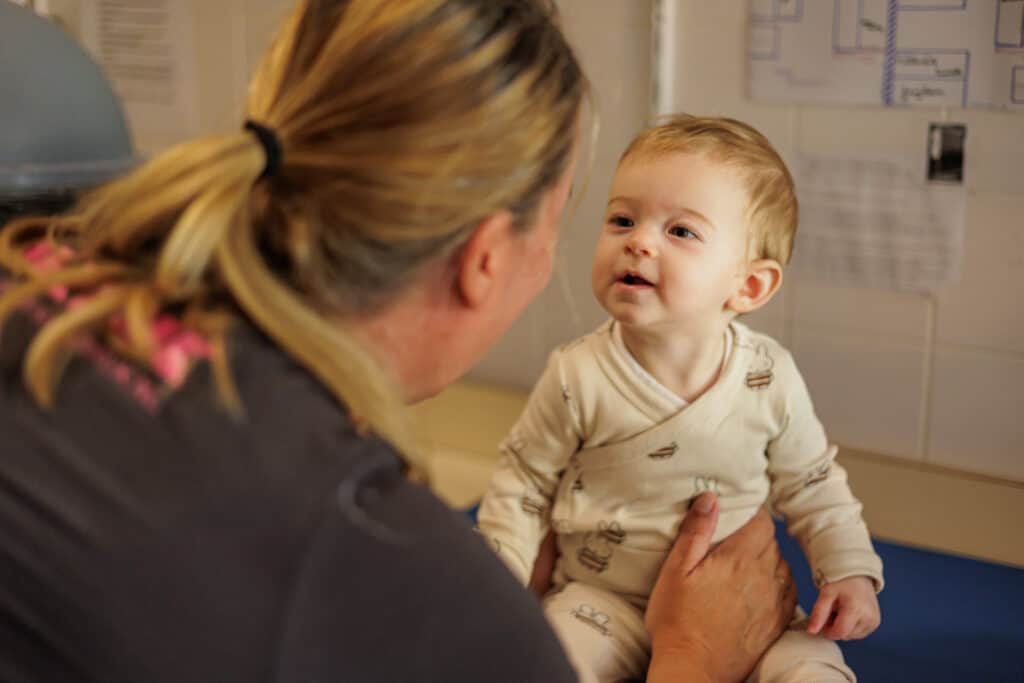
“BESIDES PERSONAL ATTENTION AND AFFECTION, WE ALSO GIVE THEM PLENTY OF SPACE TO EXPLORE ON THEIR OWN. THIS INCREASES SELF-CONFIDENCE AND SELF-ESTEEM.”
Milestones
-
Recognition of the parents
For the first 6 weeks, your baby will mainly respond to your voice, smell and facial expressions.
-
Expansion of the contacts
Your baby will also start smiling at others and even strangers after a while.
-
Discovery
At 3-4 months, your baby starts exploring and expanding his environment increasingly more.
Increasing self-confidence
By giving babies lots of personal attention, they feel secure and will develop well. Besides the personal attention and affection, we also give them plenty of space to explore on their own. This increases their self-confidence and self-esteem.
We apply a fixed daily rhythm because the predictability of nursing times gives your baby a sense of basic security. Babies love this. This is why we work with as many permanent staff members as possible and each child has his own mentor. The more emotionally secure your baby feels, the sooner he will explore, depending on his temperament. We respect everyone’s pace and provide an attractive and stimulating play environment.

Are you curious about other developmental stages?

